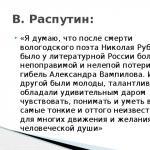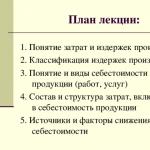Download the presentation of vampiles duck hunting. Presentation on the topic "A.V. Vampilov". What does Zilov like?
Play by A. Vampilov "Duck Hunt"
You need to write about what keeps you awake at night...
A. Vampilov
Fadeeva T.V.
MBOU gymnasium No. 3 named after. M.F. Pankova
Khabarovsk

- “I think that after the death of the Vologda poet Nikolai Rubtsov, literary Russia did not have a more irreparable and absurd loss than the death of Alexander Vampilov. Both of them were young, talented, possessed an amazing gift to feel, understand and be able to express the most subtle and therefore unknown to many movements and desires of the human soul.”

- A. Vampilov : “I started the third tragicomedy, it seems to me that it will not only be my best, it seems to me that it will be a good play...”
- “Duck Hunt” was first published in 1970 in the Angara almanac. Before this, Novy Mir tried to publish the play, but the editorial board did not come to a unanimous decision. The official reason for the refusal was: “New World” does not publish plays.


- Sayapin...- He came up with the idea for Zilov’s prank, the idea with the wreath and telegram. - He comes to stop Zilov from committing suicide and involuntarily thinks about renovating the apartment in case he gets it after the death of his “friend.” - Everything falls on Zilov when it becomes clear who is to blame for the dishonest information.

- Valeria, Sayapin's wife- Energetic, assertive. The husband admires her penetration abilities. For the sake of profit, she is ready to hit on her husband’s boss and rudely flatter her. “Here she is walking around Zilov’s new apartment, her voice is heard from different parts: “Cold, hot? Beauty! Gas? Beauty!.. Well, well, well... And here? Eighteen squares? Beauty! Balcony?.. South?.. North?.. Beauty.” She is almost like Ellochka the cannibal: minimal vocabulary.

What is the dramatic conflict, if not in the clash, the confrontation of the heroes? What drives the play?
- The conflict of the play lies in the hero himself, who is faced with the main question, the question of fate:
how and why to live? Therefore, Vampilov’s play poses not everyday, but existential problems.
- What is retrospection used for?

- We learned that Zilov was looking forward to the hunt (“I can’t imagine how to survive”), was getting an apartment, that he was mortally tired of Vera, that he was jealous of Dima’s keen eye and steady hand (“I wish I could do that!”), and was inviting friends to a housewarming party. .
- It seems like life, but somehow empty and even bitter.

Was Zilov happy?
- “Galina. We'll live together here, right? Zilov. Certainly. Galina. Just like at the very beginning. In the evenings we will read, talk... Shall we? Zilov. Necessarily".
The author notes fragility and grace in Galina . “This quality,” we read in the remark, “undoubtedly flourished in her youth, is now greatly suppressed by work, life with a frivolous husband, and the burden of unfulfilled hopes.”
Zilov’s usual “Of course”, “Definitely”, phrases “I don’t mind”, “It’s not a problem” in response to his wife’s longing for a child almost dim the flame of these hopes.

What does Zilov like?
- "Valeria. That's what you love most?.. Zilov. What I love... Let me think... Valeria. Well, my wife, that goes without saying... Galina. No, he hasn’t loved me for a long time... Valeria ( Zilov). Well, have you figured it out? Zilov. I can figure it out, I can’t figure it out. Valeria. What a dumbass. Well, what do you love - really! Galina. He loves friends most of all. Faith. Women... Kuzanov. It's all nonsense. More than anything else, Vitya loves work. Friendly laughter......Sayapin unwrapped the package. It contained items of hunting equipment... Zilov ( accepting a gift). This - yes, this - was respected... Yes. You're right. Duck hunting is a thing.”
What does this short scene add to our impressions of Zilov?

What is Zilov's second memory about?
- Zilov comments on his father’s letter (“Let’s see what the old fool writes... Well, well... Oh, my God! He’s dying again... He’ll send out such letters all over the place and lie there, like a dog, waiting”)
This is evidence of the death of the soul: heartlessness, cynicism, filial betrayal.

Does Zilov understand the terrible meaning of what happened?
- Let's pay attention to the author's remarks that complete each of the memories.
- First. Zilov drinks beer while sitting on the windowsill. Suddenly he gets up and throws the stuffed cat into the corner of the room. Second. Zilov rises. Walks around the room. He stops at the wreath. He stands in front of the wreath for a moment. “Zilov. Just kidding, you bastards! Third. With his hands behind his head, he lies on the ottoman.
Reality (the wreath) and what was resurrected in his memory led Zilov into confusion, he is tormented, feels lonely: “Dima?.. Frankly speaking, a disgusting mood... Do you know what they brought me?.. Wreath... Friends! Are these friends?.. Tell me, old man, how do you feel about me?.. And I... I’ll say this. After yesterday I was left alone..."

- “Vampilov builds the characters of his heroes in such a way that the difference between courage and seriousness, pain and ridicule is insurmountable.
- The writer offers the character of a person in whose behavior enthusiasm and cynicism, sincerity and lies, the loftiness of impulse and the baseness of action are fused together.”

Analysis of the scene - memories when Zilov says goodbye to the leaving Galina. Is the hero sincere?
“It’s my own fault, I know. I brought it to this myself... I tortured you, but I swear to you, I myself am disgusted with such a life... You’re right, I don’t care about everything, everything in the world. I don’t know what’s happening to me... I don’t know... Do I really have no heart? Yes, yes, I have nothing - only you, today I realized this, do you hear? - he turns to his wife, waiting for Irina at this time. And already to her, thinking that he was talking to Galina, he addressed words full of feelings: “I’ll take you hunting... Do you know what you’ll see there? ?! Oh!.. And the night? My God! Do you know how quiet it is there? You're not there... No! You haven't been born yet. And there is nothing. And it wasn't. And it won’t..."

Compare the interpretations of this scene in criticism.
- “There is a temptation to interpret Vampilov’s image of duck hunting as something sublimely poetic. Indeed - nature, silence, concentration of the soul... But does the author leave Zilov here hope for revival? “Do you know how quiet it is there? - explains the hero. - You're not there, do you understand? No. You haven't been born yet. And there is nothing. And it wasn't. And it won’t.” The explanation is murky. These short phrases (“And there is nothing... And there was nothing... And there will be nothing...”) seem to be hammering in nails...”
- “...Vampilov in this monologue shows the sincere and deep repentance of the hero’s soul, and not just another of his chatter, as those critics managed to perceive it, who from the very beginning deny the spiritual principles in him... (“You are not there... You have not been born yet. And there is nothing ... And there will not be” - that is, there is no more of his former self, there will not be another me) - is this vow to correct himself, to be reborn, which he gives to his wife, also a sign of “lack of spirituality”?
B. Sushkov
V. Lakshin

The meaning of the name. The motif of hunting in the play.
- Hunting connects a person with nature; hunting is associated with delight in the beauty of sunrises and sunsets, in the smell of herbs and flowers, in the colors of the forest and sky, in silence... If in nature we feel it and ourselves this way, it means that in it we are cleansed of vanity and superficial , unreal, bad in ourselves - we become morally cleansed. But hunting is also a pursuit, pursuit and death that the hunter suffers, this is a permitted, permitted murder! And Galina, Zilov’s wife, says that he never even killed a small bird. He regrets that he is not able to kill, he envies Dima’s composure. So what is hunting for him? It’s not a hobby, as Kushak said.
When hunting, Zilov is unlikely to be able to kill, but in life he hits without a miss on his family and friends, not understanding the old truth that the evil you do will return to you a hundredfold.

Analysis of the final scene
- “It’s impossible to understand whether he’s crying or laughing, but his body trembles for a long time, as it happens with strong laughter or crying... He rises, and we see his calm face. Whether he cried or laughed, we won’t be able to tell from his face.”
- The author repeats this “crying or laughing” three times: the fate of the hero, as we imagine it, depends on the interpretation of these words, already outside the play.
The main character of the play “Duck Hunt” In the minds of many, Zilov personifies the 60s and 70s. People of Zilov's generation are people who have lost their goal or have never seen it.
The tragedy of the hero of that era that he is incapable of action.

Chekhov's traditions in the play
- The author's first remark: “A city apartment in a typical house... The furniture is ordinary... The top floor and roof of a typical house are visible through the window”? What sign did the author give us here by repeating the same detail?
Vampilov: “The environment is ourselves. We, together. And if so, then isn’t it the environment for each of us individually? Yes, it turns out that the environment is how each of us works, eats, drinks, what each of us likes and what he doesn’t like, what he believes in and what he doesn’t believe in, and that means everyone can ask himself with all rigor: what Is there anything in my life, in my thoughts, in my actions that reflects badly on other people?”
The events of the play are everyday, everyday. The heroes of “Duck Hunt” just fell in love, quarreled, and broke up. Life in Vampilov's plays is an unstoppable, colorless, measured flow. But it is he who is the inexplicable source of spiritual dramas and broken destinies.
Family Alexander Vampilov was born on August 19, 1937 in the regional center of Kutulik, Irkutsk region, into an ordinary family. His father, Valentin Nikitovich, worked as the director of the Kutulik school (his ancestors were Buryat lamas), his mother, Anastasia Prokopyevna, worked there as a head teacher and mathematics teacher (her ancestors were Orthodox priests). Before Alexander was born, the family already had three children - Volodya, Misha and Galya. Several months after Alexander's birth, his father was arrested following a denunciation and shot in 1938 near Irkutsk.
Studying at the university After graduating from school, Vampilov entered the Faculty of History and Philology of Irkutsk University, which he graduated in 1960. During his studies, he published essays and feuilletons in university and regional newspapers under the pseudonym A. Sanin. Under the same pseudonym, his first book of humorous stories, “Coincidence of Circumstances” (1961), was published. In the early 1960s, he wrote his first dramatic works - one-act joke plays “Angel” (other name: “Twenty Minutes with an Angel”, 1962), “Crow Grove” (1963), “House with Windows in the Field” (1964) and etc.
“Provincial anecdotes” In 1970, Vampilov wrote the play “The Story with the Master Page” - a parable about fear, based on the story of the hotel administrator Kaloshin’s meeting with his own death. The story with the pageant, together with the play “Twenty Minutes with an Angel,” made up a tragicomic performance in 2 parts, “Provincial Anecdotes.”
“Farewell in June” In 1965 he graduated from the Higher Literary Courses at the Literary Institute. A.M. Gorky in Moscow. While studying, he wrote the comedy “Fair” (other name: “Farewell in June”, 1964), which was highly appreciated by playwrights A. Arbuzov and V. Rozov. Its hero, the cynical student Kolesov, came to the conclusion that money is not omnipotent, and tore up his dishonestly obtained diploma. In the play, the image of an angel, which runs through Vampilov’s dramaturgy, again appeared, the meeting with which transformed the hero. The presence of a higher power in the world was a constant theme in Vampilov’s work.
Vampilov - heir to the classics Returning to Irkutsk, Vampilov continued to work as a playwright. His plays were published in the magazines “Theatre”, “Modern Drama”, “Theater Life”, and were included in the repertoire of the best theaters in the country. Critics talked about the “Vampilov Theater” and saw in the characters of his plays, extraordinary people capable of high spiritual rise and at the same time weak by nature, the heirs of the classical heroes of Russian literature - Onegin, Pechorin, Protasov, Laevsky. They represented both modern “little people” (Ugarov, Khomutov, Sarafanov, etc.) and female types.
“The Eldest Son” In 1967, Vampilov wrote the plays “The Elder Son” and “Duck Hunt”, in which the tragic component of his drama was fully embodied. In the comedy The Eldest Son, within the framework of a masterfully written intrigue (the deception of the Sarafanov family by two friends, Busygin and Silva), the conversation was about the eternal values of existence - the continuity of generations, the severing of emotional ties, love and forgiveness of close people to each other. In this play, the “metaphor theme” of Vampilov’s plays begins to sound: the theme of the house as a symbol of the universe. The playwright himself, who lost his father in early childhood, perceived the relationship between father and son as particularly painful and acute.
“Duck Hunt” The hero of the play “Duck Hunt” Zilov became the victim of a dark friendly prank: his friends sent him a cemetery wreath and telegrams of condolences. This forced Zilov to remember his life in order to prove to himself that he was not dead. The hero’s own life appeared to him as a meaningless pursuit of easily accessible pleasures, which was in fact an escape from himself. Zilov understood that the only need in his life was duck hunting. Having lost interest in her, he lost interest in life and was planning to commit suicide. Vampilov left his hero alive, but the existence to which Zilov was doomed evoked both condemnation and sympathy from readers and viewers. “Duck Hunt” became a symbolic play of dramaturgy in the late 1960s.
“Last Summer in Chulimsk” In the drama In the drama Last Summer in Chulimsk (1972) Vampilov created his best female character - the young worker of the provincial teahouse Valentina. This woman strove to preserve the “living soul” within herself with the same tenacity with which throughout the play she tried to preserve the front garden, which was continually trampled by indifferent people. (1972) Vampilov created his best female image - the young worker of the provincial tea shop Valentina. This woman strove to preserve the “living soul” within herself with the same tenacity with which throughout the play she tried to preserve the front garden, which was continually trampled by indifferent people.
Ready-made presentations on history are intended both for independent study by students and for teachers during lessons. When using a history presentation in the educational process, teachers spend less time preparing for the lesson and increase the assimilation of the material by students. In this section of the site you can download ready-made presentations on history for grades 5,6,7,8,9,10, as well as many presentations on the history of the fatherland.
Years of life VAMPILOV, ALEXANDER VALENTINOVICH (1937–1972), Russian playwright, novelist, publicist
Family Alexander Vampilov was born on August 19, 1937 in the regional center of Kutulik, Irkutsk region, into an ordinary family. His father, Valentin Nikitovich, worked as the director of the Kutulik school (his ancestors were Buryat lamas), his mother, Anastasia Prokopyevna, worked there as a head teacher and mathematics teacher (her ancestors were Orthodox priests). Before Alexander was born, the family already had three children - Volodya, Misha and Galya. Several months after Alexander's birth, his father was arrested following a denunciation and shot in 1938 near Irkutsk. House-Museum of A.V. Vampilov in the village of Kutulik.

Studying at the university After graduating from school, Vampilov entered the Faculty of History and Philology of Irkutsk University, which he graduated in. During his studies, he published essays and feuilletons in university and regional newspapers under the pseudonym A. Sanin. Under the same pseudonym, his first book of humorous stories, “Coincidence of Circumstances” (1961), was published. In the early 1960s, he wrote his first dramatic works - one-act joke plays “Angel” (other name: “Twenty Minutes with an Angel”, 1962), “Crow Grove” (1963), “House with Windows in the Field” (1964) and others. Irkutsk University

Early works Vampilov's early works were based on strange, sometimes funny incidents and anecdotes. The heroes of stories and sketches, finding themselves in these strange situations, came to reassess their views. Thus, in the play Twenty Minutes with an Angel, the action of which takes place in a provincial hotel, a kind of test of the characters takes place on their ability to be selfless, as a result of which it turns out that only death is selfless in this world.

“Provincial anecdotes” In 1970, Vampilov wrote the play “The Story with the Master Page” - a parable about fear, based on the story of the hotel administrator Kaloshin’s meeting with his own death. The story with the pageant, together with the play “Twenty Minutes with an Angel,” made up a tragicomic performance in 2 parts, “Provincial Anecdotes.” A scene from a play based on Vampilov's early works. Sovremennik Theater

“Farewell in June” In 1965 he graduated from the Higher Literary Courses at the Literary Institute. A.M. Gorky in Moscow. While studying, he wrote the comedy “Fair” (other name: “Farewell in June”, 1964), which was highly appreciated by playwrights A. Arbuzov and V. Rozov. Its hero, the cynical student Kolesov, came to the conclusion that money is not omnipotent, and tore up his dishonestly obtained diploma. In the play, the image of an angel, which runs through Vampilov’s dramaturgy, again appeared, the meeting with which transformed the hero. The presence of a higher power in the world was a constant theme in Vampilov’s work.

Vampilov - heir to the classics Returning to Irkutsk, Vampilov continued to work as a playwright. His plays were published in the magazines “Theatre”, “Modern Drama”, “Theater Life”, and were included in the repertoire of the best theaters in the country. Critics talked about the “Vampilov Theater” and saw in the characters of his plays, extraordinary people capable of high spiritual rise and at the same time weak by nature, the heirs of the classical heroes of Russian literature - Onegin, Pechorin, Protasov, Laevsky. They represented both modern “little people” (Ugarov, Khomutov, Sarafanov, etc.) and female types.

“The Eldest Son” In 1967, Vampilov wrote the plays “The Elder Son” and “Duck Hunt”, in which the tragic component of his drama was fully embodied. In the comedy The Eldest Son, within the framework of a masterfully written intrigue (the deception of the Sarafanov family by two friends, Busygin and Silva), the conversation was about the eternal values of existence - the continuity of generations, the severing of emotional ties, love and forgiveness of close people to each other. In this play, the “metaphor theme” of Vampilov’s plays begins to sound: the theme of the house as a symbol of the universe. The playwright himself, who lost his father in early childhood, perceived the relationship between father and son as particularly painful and acute.

“Duck Hunt” The hero of the play “Duck Hunt” Zilov became the victim of a dark friendly prank: his friends sent him a cemetery wreath and telegrams of condolences. This forced Zilov to remember his life in order to prove to himself that he was not dead. The hero’s own life appeared to him as a meaningless pursuit of easily accessible pleasures, which was in fact an escape from himself. Zilov understood that the only need in his life was duck hunting. Having lost interest in her, he lost interest in life and was planning to commit suicide. Vampilov left his hero alive, but the existence to which Zilov was doomed evoked both condemnation and sympathy from readers and viewers. “Duck Hunt” became a symbolic play of dramaturgy in the late 1960s. Zilov - K. Khabensky. MHT.

“Last Summer in Chulimsk” In the drama In the drama Last Summer in Chulimsk (1972) Vampilov created his best female character - the young worker of the provincial teahouse Valentina. This woman strove to preserve the “living soul” within herself with the same tenacity with which throughout the play she tried to preserve the front garden, which was continually trampled by indifferent people. (1972) Vampilov created his best female image - the young worker of the provincial tea shop Valentina. This woman strove to preserve the “living soul” within herself with the same tenacity with which throughout the play she tried to preserve the front garden, which was continually trampled by indifferent people.

Death Vampilov's work was cut short by a tragic accident. Vampilov drowned in Lake Baikal on August 17 Monument to A. Vampilov in Irkutsk Memorial stone at the site of his death

Posthumous fame No sooner had the earth cooled down on Vampilov’s grave than his posthumous fame began to gain momentum. His books began to be published (only one was published during his lifetime), theaters staged his plays (The Eldest Son alone was shown in 44 theaters across the country), and studio directors began filming films based on his works. His museum was opened in Kutulik, and a Youth Theater was named after A. Vampilov in Irkutsk. A memorial stone appeared at the site of the death...

Literature %B0%D0%BC%D0%BF%D0%B8%D0%BB%D 0%BE%D0%B2+%D0%B1%D0%B8%D0%BE% D0%B3%D1%80%D0 %B0%D1%84%D0%B8% D1%8F&lr=213&ex=v11http://yandex.ru/yandsearch?text=%D0%B2%D0 %B0%D0%BC%D0%BF%D0%B8% D0%BB%D 0%BE%D0%B2+%D0%B1%D0%B8%D0%BE% D0%B3%D1%80%D0%B0%D1%84%D0%B8% D1%8F&lr=213&ex =v11 %B2%D0%B0%D0%BC%D0%BF%D0%B8%D0 %BB%D0%BE%D0%B2%20%D0%B1%D0%B8 %D0%BE%D0%B3 %D1%80%D0%B0%D1%84 %D0%B8%D1%8F

To view the presentation with pictures, design and slides, download its file and open it in PowerPoint on your computer.
Text content of presentation slides: A.V. Vampilov. Life and art. Years of life VAMPILOV, ALEXANDER VALENTINOVICH (1937–1972), Russian playwright, novelist, publicist. * * House-Museum of A.V. Vampilov in the village of Kutulik. Family Alexander Vampilov was born on August 19, 1937 in the regional center of Kutulik, Irkutsk region, into an ordinary family. His father, Valentin Nikitovich, worked as the director of the Kutulik school (his ancestors were Buryat lamas), his mother, Anastasia Prokopyevna, worked there as a head teacher and mathematics teacher (her ancestors were Orthodox priests). Before the birth of Alexander, the family already had three children - Volodya, Misha and Galya. A few months after the birth of Alexander, the father was arrested on a denunciation and shot in 1938 near Irkutsk. Irkutsk University Study at the University After graduating from school, Vampilov entered the Faculty of History and Philology of Irkutsk University, which he graduated in 1960. During his studies, he published essays and feuilletons in university and regional newspapers under the pseudonym A. Sanin. Under the same pseudonym, his first book of humorous stories, “Coincidence of Circumstances” (1961), was published. In the early 1960s, he wrote his first dramatic works - one-act joke plays “Angel” (other name: “Twenty Minutes with an Angel”, 1962), “Crow Grove” (1963), “House with Windows in the Field” (1964) and others. Vampilov’s early works were based on strange, sometimes funny incidents and anecdotes. The heroes of stories and sketches, finding themselves in these strange situations, came to reassess their views. Thus, in the play Twenty Minutes with an Angel, the action of which takes place in a provincial hotel, a kind of test of the characters takes place on their ability to be selfless, as a result of which it turns out that only death is selfless in this world. Early works A scene from a play based on Vampilov's early works. Sovremennik Theater “Provincial Anecdotes” In 1970, Vampilov wrote the play “The Story with the Pageant” - a parable about fear, based on the story of the hotel administrator Kaloshin’s meeting with his own death. The story with the pageant, together with the play “Twenty Minutes with an Angel,” made up a tragicomic performance in 2 parts, “Provincial Anecdotes.” “Farewell in June” In 1965 he graduated from the Higher Literary Courses at the Literary Institute. A.M. Gorky in Moscow. While studying, he wrote the comedy “Fair” (other name: “Farewell in June”, 1964), which was highly appreciated by playwrights A. Arbuzov and V. Rozov. Its hero, the cynical student Kolesov, came to the conclusion that money is not omnipotent, and tore up his dishonestly obtained diploma. In the play, the image of an angel, which runs through Vampilov’s dramaturgy, again appeared, the meeting with which transformed the hero. The presence of a higher power in the world was a constant theme in Vampilov’s work. Vampilov - heir to the classics Returning to Irkutsk, Vampilov continued to work as a playwright. His plays were published in the magazines “Theatre”, “Modern Drama”, “Theater Life”, and were included in the repertoire of the best theaters in the country. Critics talked about the “Vampilov Theater” and saw in the characters of his plays, extraordinary people capable of high spiritual rise and at the same time weak by nature, the heirs of the classical heroes of Russian literature - Onegin, Pechorin, Protasov, Laevsky. They represented both modern “little people” (Ugarov, Khomutov, Sarafanov, etc.) and female types. “The Eldest Son” In 1967, Vampilov wrote the plays “The Elder Son” and “Duck Hunt”, in which the tragic component of his drama was fully embodied. In the comedy The Eldest Son, within the framework of a masterfully written intrigue (the deception of the Sarafanov family by two friends, Busygin and Silva), the conversation was about the eternal values of existence - the continuity of generations, the severing of emotional ties, love and forgiveness of close people to each other. In this play, the “metaphor theme” of Vampilov’s plays begins to sound: the theme of the house as a symbol of the universe. The playwright himself, who lost his father in early childhood, perceived the relationship between father and son as particularly painful and acute. Zilov - K. Khabensky. MHT. “Duck Hunt” The hero of the play “Duck Hunt” Zilov became the victim of a dark friendly prank: his friends sent him a cemetery wreath and telegrams of condolences. This forced Zilov to remember his life in order to prove to himself that he was not dead. The hero’s own life appeared to him as a meaningless pursuit of easily accessible pleasures, which was in fact an escape from himself. Zilov understood that the only need in his life was duck hunting. Having lost interest in her, he lost interest in life and was planning to commit suicide. Vampilov left his hero alive, but the existence to which Zilov was doomed evoked both condemnation and sympathy from readers and viewers. “Duck Hunt” became a symbolic play of dramaturgy in the late 1960s. “Last Summer in Chulimsk” In the drama “Last Summer in Chulimsk” (1972), Vampilov created his best female character - the young worker of the provincial teahouse Valentina. This woman strove to preserve the “living soul” within herself with the same tenacity with which throughout the play she tried to preserve the front garden, which was continually trampled by indifferent people. (1972) Vampilov created his best female image - the young worker of the provincial tea shop Valentina. This woman strove to preserve the “living soul” within herself with the same tenacity with which throughout the play she tried to preserve the front garden, which was continually trampled by indifferent people. Monument to A. Vampilov in Irkutsk Memorial stone at the site of his death Death Vampilov’s work was cut short by a tragic accident. Vampilov drowned in Lake Baikal on August 17, 1972. Posthumous fame No sooner had the soil cooled down on Vampilov’s grave than his posthumous fame began to gain momentum. His books began to be published (only one was published during his lifetime), theaters staged his plays (The Eldest Son alone was shown in 44 theaters across the country), and studio directors began filming films based on his works. His museum was opened in Kutulik, and a Youth Theater was named after A. Vampilov in Irkutsk. A memorial stone appeared at the site of the death...
Slide 1
 Slide 2
Slide 2
 Slide 3
Slide 3
 Slide 4
Slide 4
 Slide 5
Slide 5
 Slide 6
Slide 6
 Slide 7
Slide 7
 Slide 8
Slide 8
 Slide 9
Slide 9
 Slide 10
Slide 10
The presentation on the topic “Vampilov Alexander Valentinovich” (9th grade) can be downloaded absolutely free on our website. Subject of the project: Literature. Colorful slides and illustrations will help you engage your classmates or audience. To view the content, use the player, or if you want to download the report, click on the corresponding text under the player. The presentation contains 10 slide(s).
Presentation slides

Slide 1
Vampilov Alexander Valentinovich. (1937- 1972)
Incomparable Tips.

Slide 2
Alexander Vampilov became Alexander because the year of his birth (1937) marked one hundred years since Russia lost Pushkin - the boy’s father was a literature teacher, and how could he have called his son anything else?.. After graduating from school, Vampilov entered to the Faculty of History and Philology of Irkutsk University, from which he graduated in 1960. Vampilov’s work was cut short by a tragic accident. Two days before his 35th birthday, on August 17, 1972, Vampilov and his friends went on vacation to Lake Baikal. The boat caught on a snag and capsized. Vampilov decided to swim to the shore. He reached it, touched the ground with his feet, and at that moment his heart could not stand it. An unfinished work remained on his desk - the vaudeville “The Incomparable Tips”...

Slide 3
By the age of 35, Vampilov had written five plays, the same number as Chekhov. It had already been staged in many provincial theaters, and he became a fashionable playwright in Moscow and Leningrad. Alexander Vampilov did not live to see his Moscow premieres, which he dreamed of more than anything else in the world, exactly a month ago. Only a year will pass, and he will become the “leader of the repertoire”; there will be almost no theaters left in the country where Vampilov’s plays are not performed. The Ermolova Theater and Sovremennik, the Moscow Art Theater and the Bolshoi Drama Theater will include him among their title authors.

Slide 4
Alexander Vampilov is one of those rare names and phenomena in Russian literature (I would also include Nikolai Rubtsov here) for whom loud public words seem small and overwhelming. They are of a different measure. Before talking about Vampilov, I would like to remain silent - both over his fate, which during his life was not spoiled with recognition, which ended his life early, and before meeting his heroes, standing in that direction where it is not crowded with crowds, because goodness, light, conscience and hope there are quiet, unearthly and convincing. Valentin Rasputin

Slide 5

Slide 6
Prove that the presented skit is a vaudeville?
What's so funny about the situation? The dialogue between Nakonechnikov and Eduardov includes singing and dancing. What role do they play in the play? Can the characters’ judgments and actions be considered frivolous and vaudeville?

Slide 7
What is vaudeville exposition? What is her role?
An old barbershop in a big city. A small room, part of which is curtained with a curtain. Three work chairs, mirrors, a hanger by the door, a table nearby for newspapers and two chairs for customers waiting in line. Summer day, afternoon. The door to the street is wide open. Somewhere nearby they are playing a monotonous pop tune. Lounging in one of the chairs was a simple-minded young man in a white jacket. This is the master of the Tips establishment. Worn out by the heat and forced idleness, yawning from time to time, he leafs through a thin book with color pictures. At that moment, Dutov appears, a man of about sixty, corpulent, balding, wiping sweat from his forehead and neck.

Slide 8
At what point does the thought of changing profession appear in the hero’s head? What stages does it go through?
I see you're lucky... (Not right away.) Listen, how is talent defined? Who defines it? How to say?.. At first nothing. Then this and that... (Breathes heavily.) Now - I don’t know... In short, I’m tired... (Not right away.) What to do? Where to go? Three years... I settled here after the army. Originally from a rural background. I have only seven classes... EDWARDS. So try it. Suddenly - talent. TIPS. Do they pay for this? How to write them - plays? What should I write about? Mikhail Nakonechnikov. Playwright. Don’t you know this?....Well, nothing. You'll hear more.

Slide 9
The main character is a young hairdresser, Mikhail Nakonechnikov, who suddenly discovered his gift for drama. Like any aspiring author, he is driven by contradictory aspirations - a thirst for fame and a painful need to speak out, doubts in his own abilities and an unconditional belief in the exclusivity of his creation.






